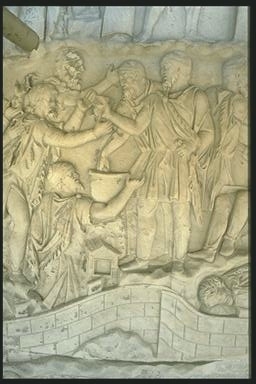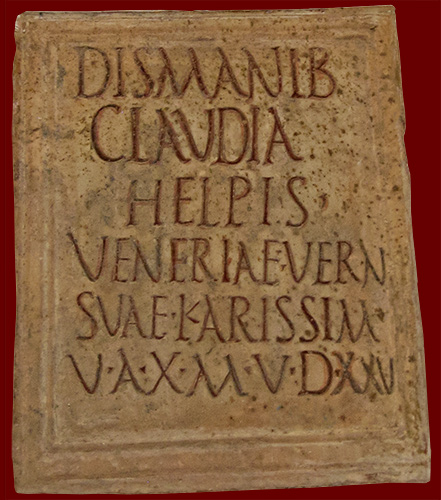|
Tentative Schedule of Topics and Readings

Dacians nobles appear to be receiving some sort of liquid (poison?) handed out by an important-looking Dacian noble, Column of Trajan, scene 120
Week I: Overview of Greek and Roman slavery
|
Day 1
|
AM
|
Introduction
|
|
|
PM
|
Sources for Roman slavery; Defining Slavery
Jean Andreau and Raymond Descat, The Slave in Greece and Rome, Ch 1;
Page duBois, “Living Slaves,” Slavery, Antiquity and its Legacy
Ancient Texts: Tiro (Cicero, ad Fam. 16.16), Abaskantis(P.Turner 22), the slave with no tongue; cooks (Livy 39.6.7, Martial 8.23, CIL 6.6249 Rome, columbaria, House of Menander) |
|
Day 2
|
AM
|
Finding Primary and Secondary Sources on ancient slavery: texts, inscriptions, law, and archaeology |
|
|
PM
|
Where do slaves come from? How many slaves?
Andreau and Descat, “A Slave Population,” The Slave in Greece and Rome, Ch 3;
Sandra Joshel, “The Sale of Slaves,” Slavery in the Roman World (Cambridge 2010) 78-110.
Ancient Texts: The Column of Trajan (Please read the intro and search the database for images of Dacians)
Modern parallels: The Interesting Narrative of the Life of Olaudah Equiano, written by Himself (1789) Ch 5
Presentation: John R. Clarke, “Imperial representation of non-elites: Augustus's and Trajan's messages to commoners,” Art in the Lives of Ordinary Romans (California 2003) |
|
Day 3
|
AM
|
Writing an Abstract: Discussion of sample abstracts, 10 a.m. Submit sample abstract from the APA or CAMWS to Laura Farmer and John Gruber-Miller by 8 a.m.
|
|
|
PM
|
Slaves and the economy
Andreau and Descat, “The Slave and Economic Life,” The Slave in Greece and Rome, Ch 4;
Keith Bradley, “Slave Labor,” Slavery and Society at Rome (Cambridge 1994) 57-80.
Ancient Texts: Columella, De Re Rustica 1.7-9
Modern Parallels: Frederick Douglass, Narrative of the Life of Frederick Douglass, An American Slave, Chapters 2-4
Presentation: Susan Treggiari, “Domestic Staff at Rome in the Julio-Claudian Period, 27 B.C. to A.D. 68,” Histoire sociale/Social History 6 (12) (1973): 241-255. |
|
Day 4
|
AM
|
Paper Conferences with Professor Gruber-Miller
|
|
|
PM
|
Life as a Slave, Slave-Master Relations
Andreau and Descat, “The Slave in the Household and the City,” The Slave in Greece and Rome, Ch 5;
Jonathan Edmondson,”Slavery and the Roman Family,” The Cambridge World History of Slavery. Vol. 1, The Ancient Mediterranean World, ed. Keith Bradley and Paul Cartledge (Cambridge 2011) 337-61.
Ancient Texts: Valerius Maximus 6.8
Modern Parallels: Harriet Jacobs, Incidents in the Life of a Slave Girl, Chs 10-11 |
Day 5
|
AM
|
Small Group workshops: bring a one page abstract to the conference
One page abstract of research paper due Saturday at noon.
|
|
|
PM
|
Resisting Slavery, Escaping Slavery
Andreau and Descat, “Escaping Slavery,” The Slave in Greece and Rome, Ch 6;
Keith Bradley, “Resisting Slavery at Rome,” The Cambridge World History of Slavery. Vol. 1, The Ancient Mediterranean World, ed. Keith Bradley and Paul Cartledge (Cambridge 2011) 362-84.
Ancient Texts: Slave Resistance, Phaedrus (select fables in Latin)
Modern Parallels: Frederick Douglass, Narrative of the Life of Frederick Douglass, An American Slave, Chapter 10
|

marble funerary tablet erected by Claudia Helpis, from Rome, second century CE;
In this inscription, found on the Via Appia in Rome, the freedwoman Claudia Helpis commemorates her "dearest home-bred slave" (carissima verna), named Veneria, who lived 10 years, 5 months, and 25 days.
Week II: Methods
|
Day 6
|
AM
|
Finding Bibliography, one-on-one in Cole Library |
|
|
PM
|
Reading Public and Hidden Transcripts
James Scott, Domination and the Arts of Resistance. Hidden Transcripts (Yale 1990)
Select fables of Aesop; Phaedrus, Prologue to Book 3
Presentation A: Sara Forsdyke, ”Slaves Tell Tales: The Culture of Subordinate Groups in Ancient Greece,” Slaves Tell Tales and Other Episodes in the Politics of Popular Culture in Ancient Greece (Princeton 2012) 37-89.
Presentation B: Leslie Kurke, “Aesop and the Contestation of Delphic Authority,” Aesopic Conversations: Popular Tradition, Cultural Dialogue, and the Invention of Greek Prose (Princeton 2011) 55-94.
|
|
Day 7
|
AM
|
Library Research at the University of Iowa
|
|
|
PM
|
Justifications of Slavery, ancient and modern
Ancient Texts: Aristotle, Politics Book 1
Seneca
Presentation A: S. Sara Monoson, “Navigating Race, Class, Polis, and Empire: The Place of Empirical Analysis in Aristotle’s Account of Natural Slavery,” Reading Ancient Slavery, ed. Richard Alston, Edith Hall, and Laura Proffitt (Bristol Classical Press 2011) 133-51 or “Recollecting Aristotle: Pro-Slavery Thought in Antebellum America and the Argument of Politics Book 1,” Ancient Slavery and Abolition, ed. Edith Hall, Richard Alston, and Justine McConnell (Oxford 2011) 247-77.
Presentation B: Margaret Malamud, “Rome and the Politics of Slavery,” Ancient Rome and Modern America (Wiley-Blackwell 2009) 70-97 |
|
Day 8
|
AM
|
Workshop: writing the Literature Review
|
|
|
PM
|
Reading and Writing |
|
Day 9
|
AM
|
Reading and Writing Day; individual conferences |
|
|
PM
|
|
|
Day 10
|
AM
|
Small Group Workshops: Please submit the first 5 pages of your paper, including the Introduction, Thesis, Literature Review, and bibliography on Google Drive before 8:00 a.m. Please provide substantive comments on the papers of the other members of your workshop group before coming to your workshop. Be prepared to share your comments orally in the workshop. Finally, please bring two hard copies of your paper to the workshop.
|
|
|
PM
|
Small Group Workshops (cont.)
|
Week III: Writing, Reading, Revising
|
Day 11
|
AM
|
|
|
|
PM
|
Freed Slaves and the archaeological record
Michelle George, “Slavery and Roman Material Culture,” The Cambridge World History of Slavery. Vol. 1, The Ancient Mediterranean World, ed. Keith Bradley and Paul Cartledge (Cambridge 2011) 385-413.
Presentation A: Lauren Hackworth Petersen, “The Visibility of the Augustales in Pompeii,” The Freedman in Roman Art and Art History (Cambridge 2006) 57-83.
Presentation B: Lauren Hackworth Petersen, “Family and Community at the Isola Sacra Necropolis: The Tomb of the Varii,” 184-226. |
|
Day 12
|
AM
|
|
|
|
PM
|
Slavery in the literary imagination
Ovid, Amores 1.11 (Latin) and 1.12 (English)
Presentation A: Kathleen McCarthy, “Servitium amoris: Amor servitii,” Women and Slaves in Greco-Roman Culture, ed. Sandra Joshel and Sheila Murnaghan (Routledge 1998)
Presentation B: William Fitzgerald, Slavery and the Roman Literary Imagination, Chapters 3-4 (on Reserve) |
|
Day 13
|
AM
|
Writing Day; individual conferences
|
|
|
PM
|
|
|
Day 14
|
AM
|
Presentations
|
|
|
PM
|
Presentations
|
|
Day 15
|
AM
|
Spartacus (1960), starring Kirk Douglas, Jean Simmons, Laurence Olivier, Charles Laughton, Peter Ustinov
part 1 (running time: 1 h. 44 m.);
part 2 (running time: 1 h. 23 m.)
"The Principal Ancient Sources on Spartacus," from Martin Winkler, ed. Spartacus: Film and History (Moodle) |
|
|
PM
|
discussion of Spartacus
|
Week IV: Revising and Editing
|
Day 16
|
AM
|
Presentations
|
|
|
PM
|
Presentations
|
|
Day 17
|
AM
|
Revising your paper; individual conferences
|
|
|
PM
|
|
|
Day 18
|
AM
|
Submit Reflective Essay (two pages) and final version of your Thesis
|
|


